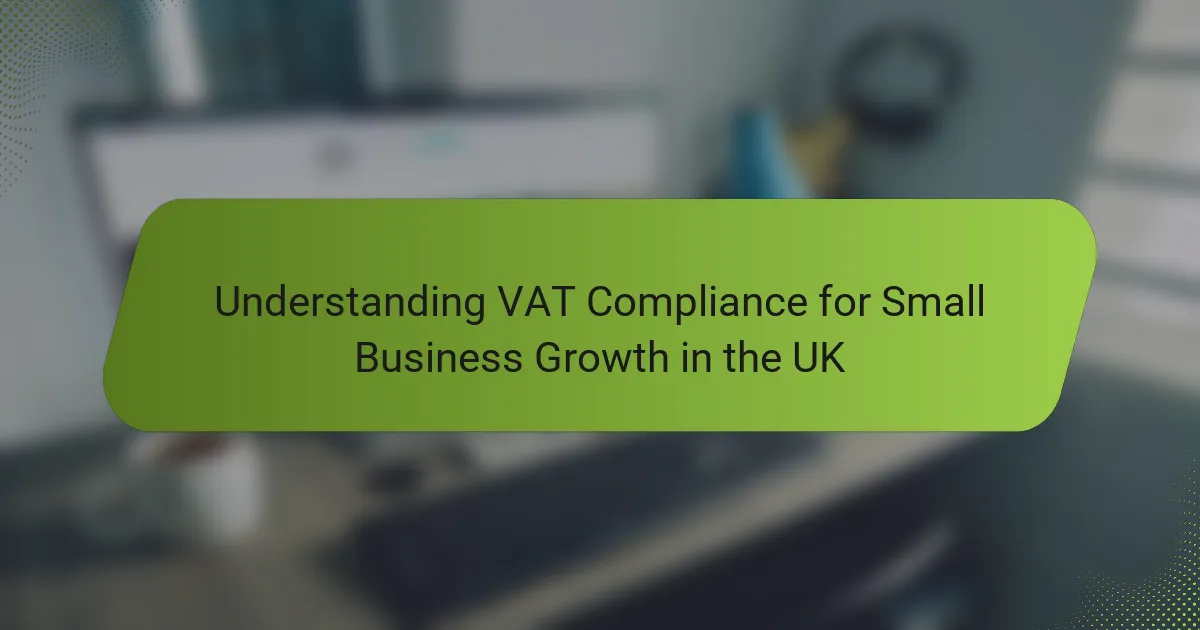Understanding VAT compliance is crucial for small businesses in the UK, as it can drive growth by enhancing credibility and expanding market access. By adhering to VAT regulations, businesses not only avoid penalties but also improve their financial management and build trust with clients. Proper registration and record-keeping are essential steps in ensuring compliance and leveraging the benefits of VAT for business success.
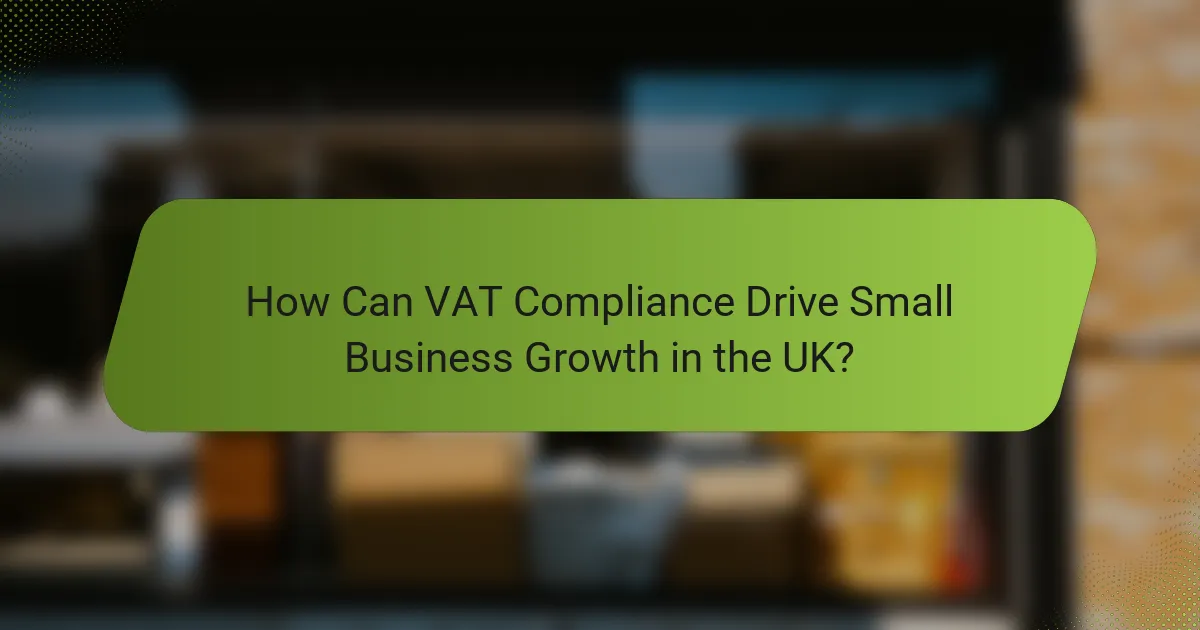
How Can VAT Compliance Drive Small Business Growth in the UK?
VAT compliance can significantly enhance small business growth in the UK by establishing credibility, expanding market access, and improving cash flow management. Adhering to VAT regulations not only builds trust with clients but also opens up opportunities in larger markets and helps manage finances more effectively.
Increased credibility with clients
Being VAT compliant enhances a small business’s credibility with clients, as it signals professionalism and adherence to legal standards. Clients often prefer to work with businesses that are registered for VAT, as it indicates reliability and a commitment to transparency.
For example, a VAT-registered business can issue valid VAT invoices, which clients may require for their own accounting purposes. This can lead to stronger business relationships and repeat contracts.
Access to wider markets
VAT compliance allows small businesses to access wider markets, including larger clients and government contracts that often stipulate VAT registration as a requirement. This can be particularly beneficial for businesses looking to expand their customer base beyond local clients.
Furthermore, being VAT registered enables businesses to trade more easily with other VAT-registered companies across the UK and the EU, as they can reclaim VAT on purchases, making their offerings more competitive.
Improved cash flow management
Effective VAT compliance can lead to improved cash flow management for small businesses. By accurately tracking VAT collected and paid, businesses can better forecast their cash flow needs and avoid unexpected shortfalls.
Additionally, businesses can reclaim VAT on eligible expenses, which can provide a significant boost to cash flow. Regularly reviewing VAT obligations and ensuring timely submissions can prevent penalties and interest charges, further stabilizing finances.
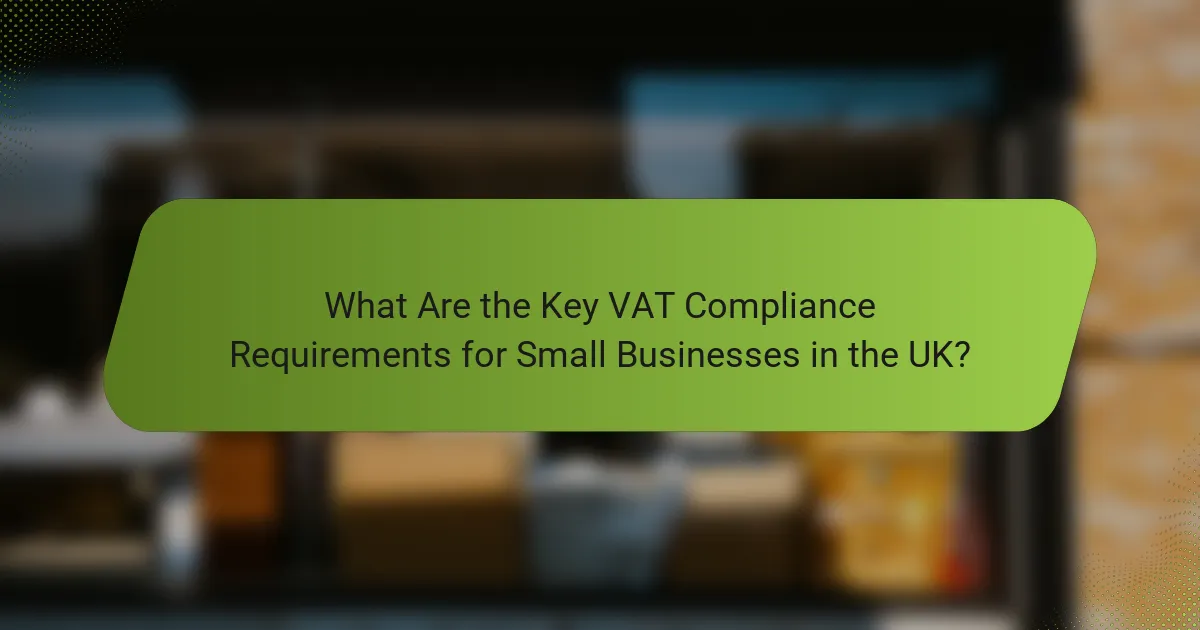
What Are the Key VAT Compliance Requirements for Small Businesses in the UK?
Small businesses in the UK must adhere to specific VAT compliance requirements to ensure legal operation and avoid penalties. Key aspects include registration thresholds, filing frequency, and record-keeping obligations that are crucial for managing VAT effectively.
Registration thresholds
In the UK, small businesses must register for VAT if their taxable turnover exceeds the registration threshold, which is typically set at around £85,000. Businesses can also voluntarily register for VAT even if their turnover is below this threshold, which may allow them to reclaim VAT on purchases.
It’s important to monitor your turnover closely, as failing to register when required can lead to significant fines. If your business is approaching the threshold, consider preparing for registration early to streamline the process.
Filing frequency
Once registered, small businesses must file VAT returns, which detail sales and purchases, usually on a quarterly basis. However, some businesses may qualify for annual VAT returns, which can simplify the filing process.
Timely submission is crucial; late filings can incur penalties. Setting reminders for filing dates and preparing records in advance can help ensure compliance and avoid unnecessary fees.
Record-keeping obligations
Small businesses must maintain accurate records of all sales and purchases, including invoices and receipts, for at least six years. This documentation is essential for completing VAT returns and may be required during audits.
Consider implementing a reliable accounting system to track transactions efficiently. Regularly reviewing records can help identify discrepancies early and ensure that all VAT obligations are met without complications.
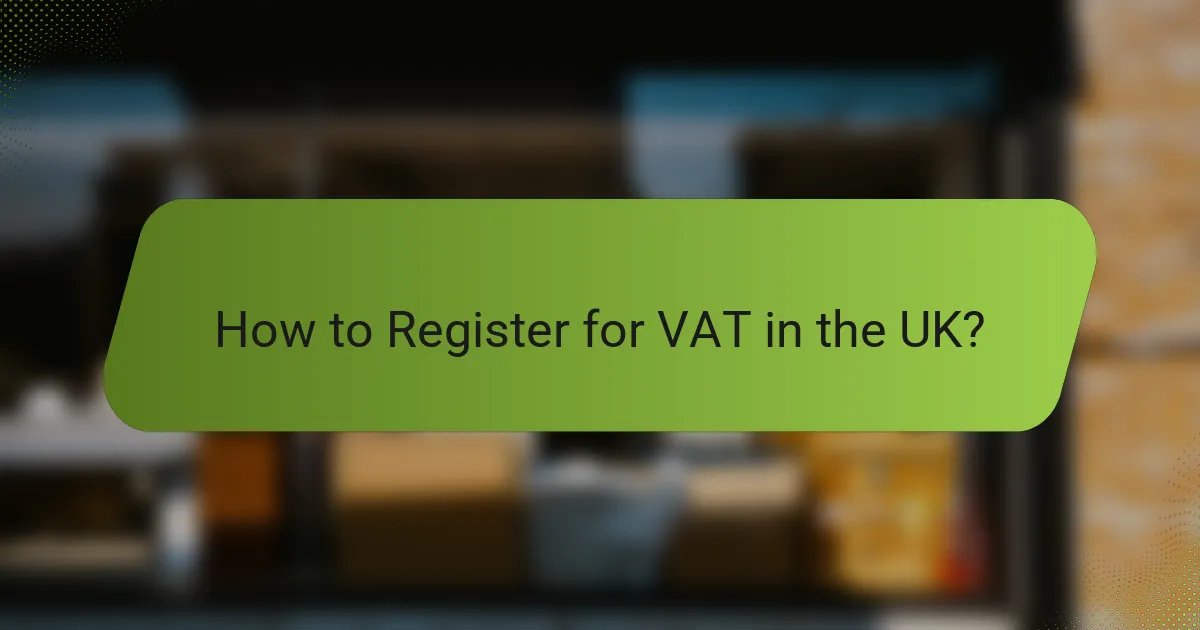
How to Register for VAT in the UK?
To register for VAT in the UK, businesses must apply to HM Revenue and Customs (HMRC) once their taxable turnover exceeds the VAT threshold, which is currently set at £85,000. Registration can be completed online, and it is essential for compliance and reclaiming VAT on business expenses.
Online registration process
The online registration process for VAT in the UK is straightforward. Businesses can register through the HMRC website by creating a Government Gateway account. Once logged in, you can complete the VAT registration form, which typically takes about 20 to 30 minutes.
After submitting the application, HMRC usually processes it within a few weeks, although it can take longer during busy periods. You will receive a VAT registration number, which must be displayed on invoices and used for all VAT-related transactions.
Required documentation
Additionally, you may need to submit proof of identity and address, such as a passport or utility bill. Having these documents ready can streamline the registration process and help avoid delays.
Common registration mistakes
One common mistake during VAT registration is underestimating your taxable turnover. Ensure you accurately assess your sales to avoid penalties for late registration. If your turnover exceeds the threshold, you must register promptly.
Another frequent error is failing to keep proper records. HMRC requires businesses to maintain accurate financial records, so ensure you have a reliable accounting system in place from the start. This will help you stay compliant and make future VAT returns easier to manage.
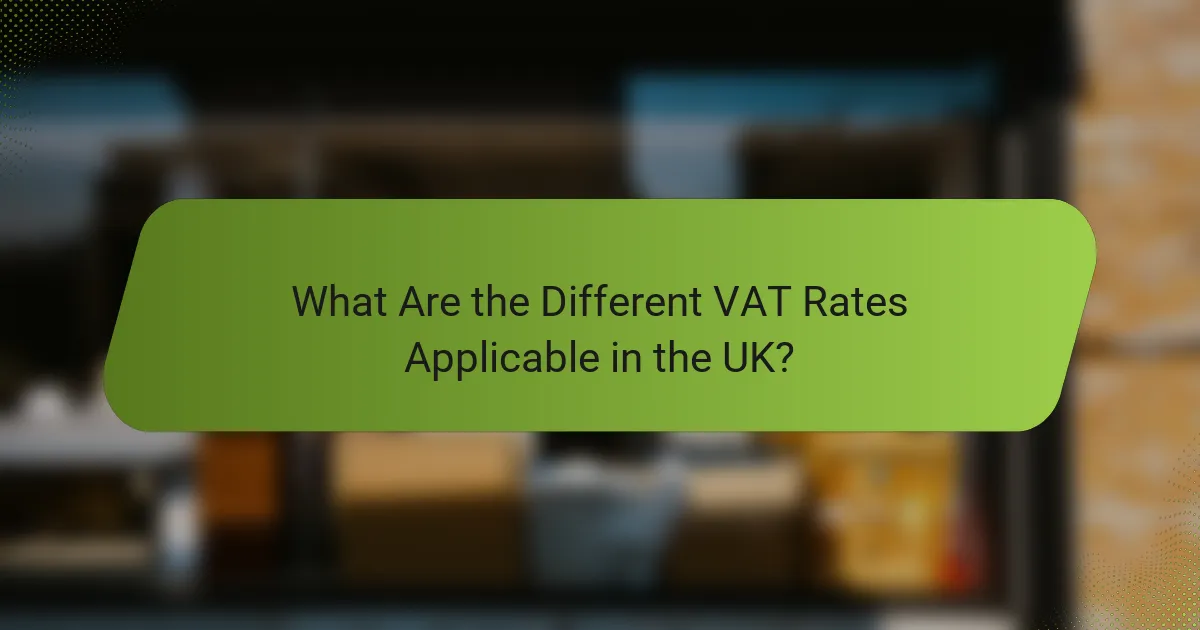
What Are the Different VAT Rates Applicable in the UK?
The UK has three main VAT rates: the standard rate, the reduced rate, and the zero rate. Each rate applies to different goods and services, impacting how small businesses manage pricing and compliance.
Standard rate
The standard VAT rate in the UK is currently set at 20%. This rate applies to most goods and services, meaning that businesses must charge this rate on their sales unless a specific exemption applies. It’s crucial for small businesses to accurately calculate VAT on their invoices to ensure compliance.
For example, if a small business sells a product for £100, it must add £20 in VAT, totaling £120 for the customer. Businesses can reclaim the VAT they pay on their purchases, which helps manage cash flow.
Reduced rate
The reduced VAT rate is 5% and applies to certain goods and services, such as home energy and children’s car seats. This lower rate can benefit businesses in specific sectors, allowing them to offer competitive pricing while remaining compliant with tax regulations.
For instance, if a small business sells a qualifying product for £100, the VAT charged would be £5, making the total £105. Understanding which products qualify for the reduced rate is essential for accurate pricing and compliance.
Zero rate
The zero VAT rate applies to specific goods and services, such as food, children’s clothing, and books. While no VAT is charged on these items, businesses must still keep accurate records and report these sales in their VAT returns.
For example, if a small business sells a loaf of bread for £1, no VAT is added, and the total remains £1. Businesses can still reclaim VAT on related expenses, which can help maintain profitability despite the zero rate on sales.
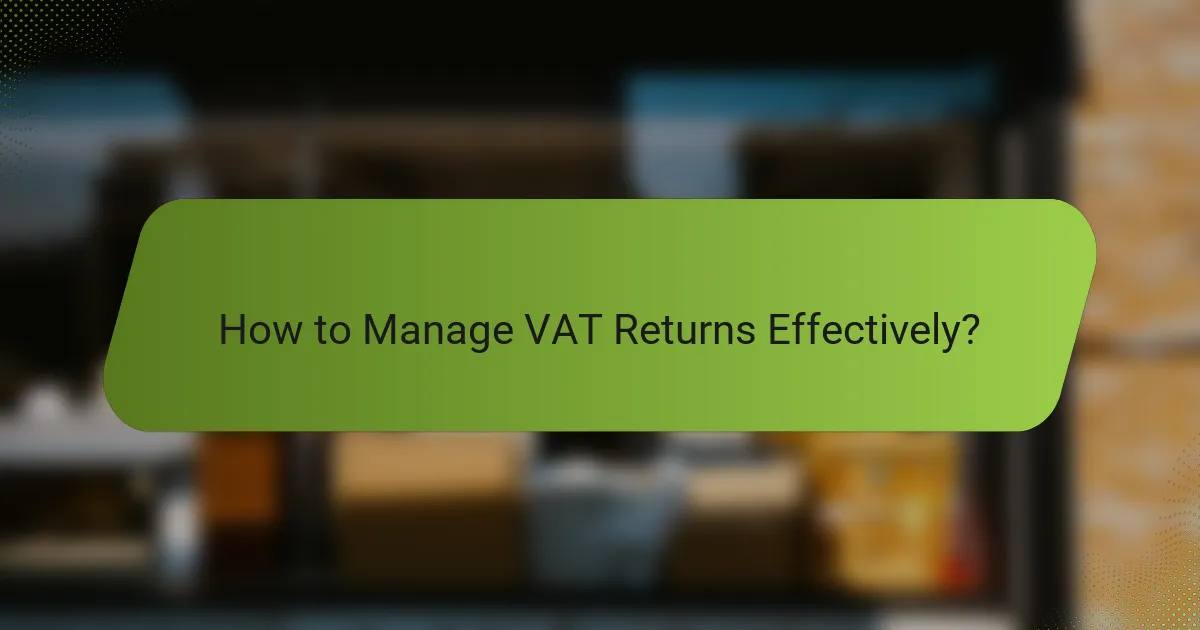
How to Manage VAT Returns Effectively?
Managing VAT returns effectively is crucial for small businesses in the UK to ensure compliance and avoid penalties. This involves accurately tracking sales and purchases, submitting returns on time, and keeping thorough records.
Using accounting software
Utilizing accounting software can significantly streamline the VAT return process. Many programs are designed to automatically calculate VAT based on your transactions, reducing the risk of errors. Look for software that integrates with your sales systems and offers features like real-time reporting and easy submission to HMRC.
Popular options include QuickBooks, Xero, and Sage, which cater to various business sizes and needs. These tools often provide templates and reminders for submission deadlines, helping you stay organized and compliant.
Common pitfalls to avoid
One common pitfall is failing to keep accurate records of all transactions, which can lead to discrepancies in your VAT returns. Ensure you maintain detailed invoices and receipts for both sales and purchases to support your claims. Regularly reconcile your accounts to catch any inconsistencies early.
Another issue is missing submission deadlines, which can result in penalties. Set reminders well in advance of the due date and consider scheduling your VAT return preparation as part of your regular accounting routine to avoid last-minute stress.
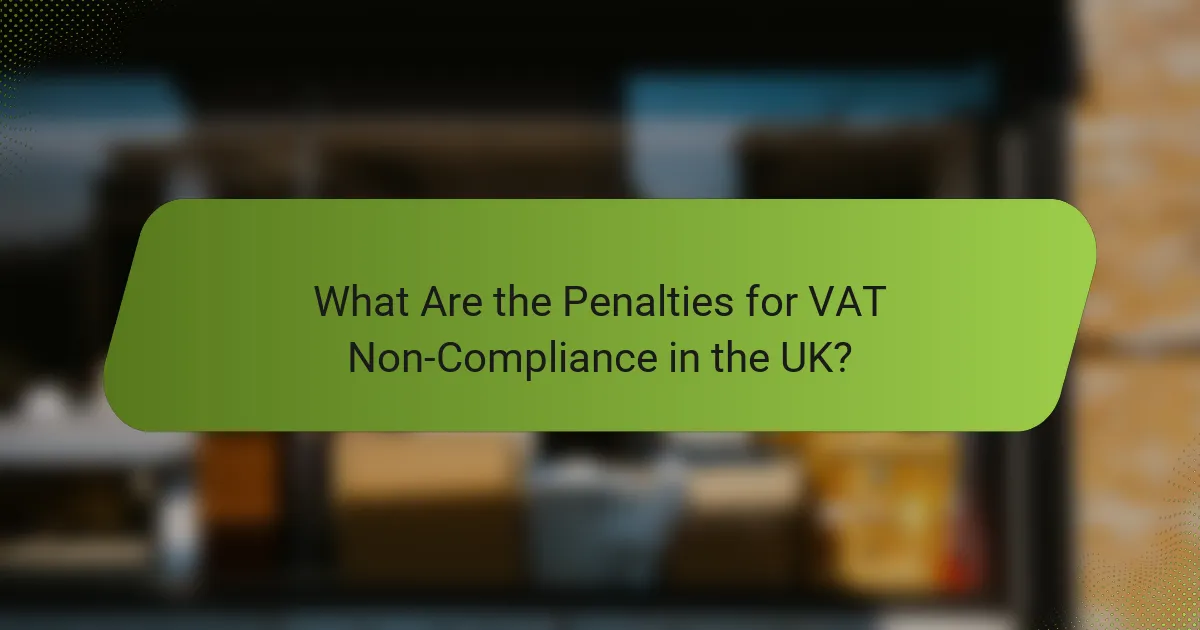
What Are the Penalties for VAT Non-Compliance in the UK?
In the UK, penalties for VAT non-compliance can be significant and vary based on the severity of the violation. Businesses may face financial penalties, interest on unpaid VAT, and even criminal charges in extreme cases.
Financial penalties
Financial penalties for VAT non-compliance can range from a percentage of the unpaid tax to fixed amounts depending on the nature of the offense. For example, if a business fails to submit VAT returns on time, they may incur a penalty of 5% of the unpaid VAT after a specified period.
Repeated offenses or serious inaccuracies can lead to higher penalties, potentially reaching 15% or more of the unpaid VAT. Businesses should be aware that the penalties can accumulate quickly, especially if the non-compliance persists over time.
To avoid financial penalties, small businesses should implement a robust accounting system, ensure timely submission of VAT returns, and regularly review their VAT compliance status. Seeking professional advice can also help mitigate risks associated with VAT obligations.
